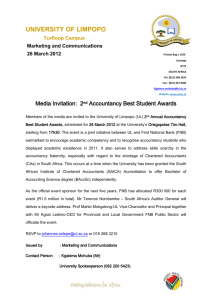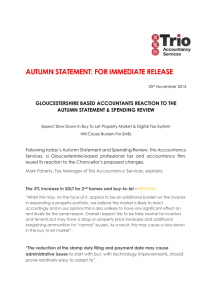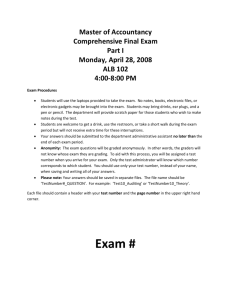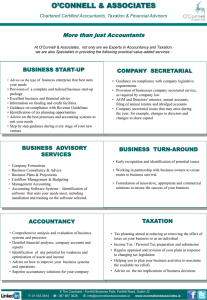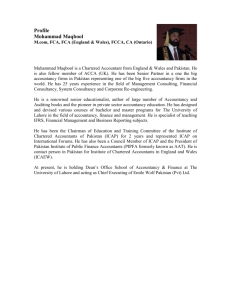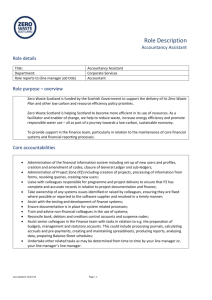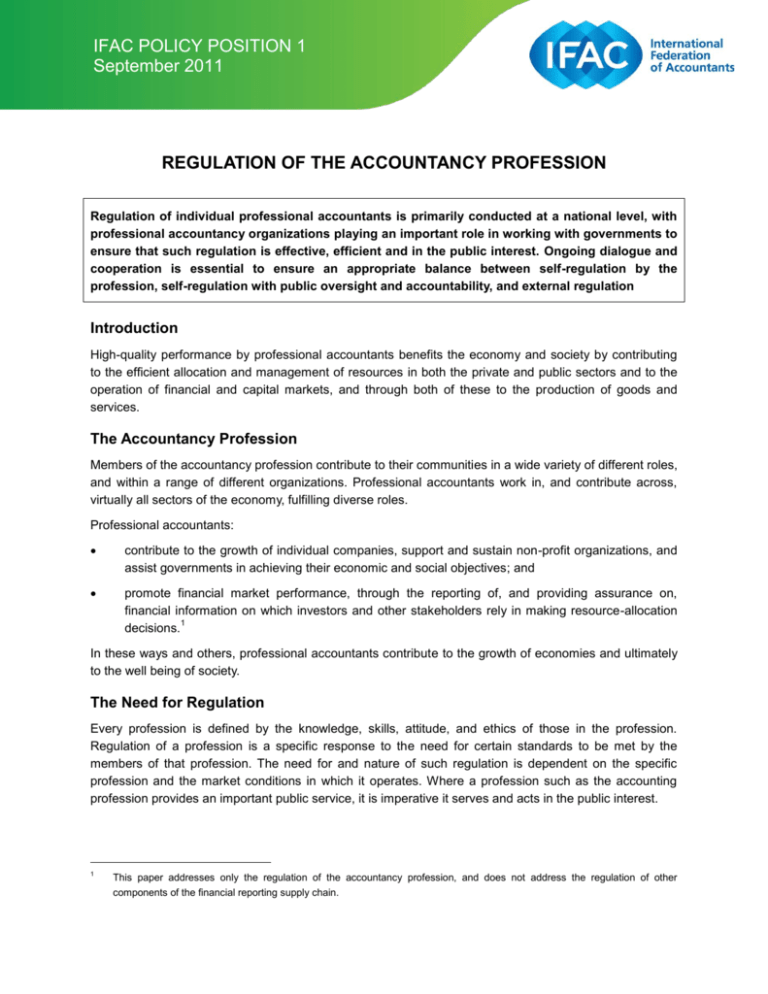
IFAC POLICY POSITION 1
September 2011
REGULATION OF THE ACCOUNTANCY PROFESSION
Regulation of individual professional accountants is primarily conducted at a national level, with
professional accountancy organizations playing an important role in working with governments to
ensure that such regulation is effective, efficient and in the public interest. Ongoing dialogue and
cooperation is essential to ensure an appropriate balance between self-regulation by the
profession, self-regulation with public oversight and accountability, and external regulation
Introduction
High-quality performance by professional accountants benefits the economy and society by contributing
to the efficient allocation and management of resources in both the private and public sectors and to the
operation of financial and capital markets, and through both of these to the production of goods and
services.
The Accountancy Profession
Members of the accountancy profession contribute to their communities in a wide variety of different roles,
and within a range of different organizations. Professional accountants work in, and contribute across,
virtually all sectors of the economy, fulfilling diverse roles.
Professional accountants:
contribute to the growth of individual companies, support and sustain non-profit organizations, and
assist governments in achieving their economic and social objectives; and
promote financial market performance, through the reporting of, and providing assurance on,
financial information on which investors and other stakeholders rely in making resource-allocation
1
decisions.
In these ways and others, professional accountants contribute to the growth of economies and ultimately
to the well being of society.
The Need for Regulation
Every profession is defined by the knowledge, skills, attitude, and ethics of those in the profession.
Regulation of a profession is a specific response to the need for certain standards to be met by the
members of that profession. The need for and nature of such regulation is dependent on the specific
profession and the market conditions in which it operates. Where a profession such as the accounting
profession provides an important public service, it is imperative it serves and acts in the public interest.
1
This paper addresses only the regulation of the accountancy profession, and does not address the regulation of other
components of the financial reporting supply chain.
Like other professions, the sustainability of the accountancy profession depends upon the quality of the
services provided by its members and on the profession’s capacity to respond effectively and efficiently to
the demands of the economy and society. Regulation seeks to ensure the right quality and, where
2
appropriate, consistency in the quality of accountancy services.
There are a number of reasons why regulation might be necessary to ensure that appropriate quality is
3
provided in the market for accountancy services. These include ensuring compliance with ethics,
technical, and professional standards and the need to represent non-contracting users of accounting
services, such as investors and creditors.
While specific triggers for regulatory change will differ over time, there are two generally accepted
explanations why regulation may be an effective means of ensuring quality and addressing inefficiencies
inherent in the operation of the market for accountancy services.
Firstly, regulation may assist in situations where there is a knowledge imbalance between the client, who
is acquiring accountancy services, and the provider of those services, who has professional expertise
4
(refer to Box 1).
Box 1: Benefit of Regulation – Addressing Knowledge Imbalance
Regulation can address the knowledge imbalance between the provider and purchaser of professional
services by providing a level of comfort to the purchaser that the provider has the necessary qualifications
and is obliged to meet the appropriate professional standards in his or her work. In this way, the
purchaser is given comfort that they are receiving services of the right quality.
Secondly, regulation may assist where there are significant benefits or costs from the provision of
accountancy services that accrue to third parties, other than those acquiring and producing the services
5
(refer to Box 2).
Box 2: Benefit of Regulation – Impact on Third Parties
Regulation can address situations where parties outside of the contracting parties (the purchaser and
provider of services) either receive benefits or incur costs as a result of the transaction. Regulation can
ensure that those benefits and costs to third parties are taken into account in determining what service is
to be produced, and at what quality. For example, because financial statements have a much wider use
beyond the company acquiring an audit, regulation of financial reporting and audit ensures that investors
or potential investors (being the third parties) receive the information they require. Regulation acts to
ensure that the benefits to these third parties are “built in,” when a company contracts for an audit.
2
The generic term in economics for situations where regulation is deemed necessary to ensure market efficiency is “market
failure.” Market failure can arise for a number of reasons, and does not necessarily mean there is either a lack of competition
within the market or failure (including anti-competitive behavior) on the part of market participants. Generally, professional
services are subject to some form of regulation given the nature of the services, which for the accountancy profession involves
operating in the public interest.
3
Competition in a market is, generally, a powerful force in driving improvements in product or service quality and value. The
market for accountancy services, which appears to be quite active, is clearly one mechanism to ensure overall quality and
consistency as professional accountants compete to offer the best value services. For this reason, most economies have in
place laws or regulations to protect competition. This area of regulation is not the subject of this policy position paper.
4
The technical term for this type of market failure is ‘information asymmetry’.
5
The technical term for this type of market failure is ‘externalities’.
2
Regulation
There have been many changes to the regulatory environment for the accountancy profession in recent
years as professional accountants, their clients, professional accountancy organizations, and
governments seek to ensure that the profession continues to deliver high-quality services and contributes
to economic growth and development. Some of these changes have been driven by perceived
shortcomings in regulatory arrangements, and debate continues about the optimal model for such
regulation.
Characteristics of Good Regulation
In designing and implementing regulation, care needs to be taken that the nature and characteristics of
the operation of the market are well understood; otherwise, the regulation may not achieve its purpose. To
meet the public interest, regulation must be proportionate, transparent, non-discriminatory, targeted,
implemented consistently and fairly, and subject to regular review. In addition, effective regulation must
not be anti-competitive, and the benefits of regulation to the economy and society should outweigh the
6
costs of that regulation. Regulation that meets these criteria is more likely to achieve the required
outcomes and to be acceptable and credible to the public at large.
Furthermore, regulation needs to be transparent. Regulatory bodies should have robust governance
arrangements and publicly disclose details of their activities. Transparency is particularly important as it
enables the public to know and understand how the profession is being regulated and what the regulator
is doing. This information adds to the credibility of regulation and makes it more effective by providing the
public with the means to judge the value of regulation and its impact on the market.
Areas that Regulation of the Accountancy Profession Typically Cover
It is important to have high-quality standards as these provide a foundation for members of the
profession, users of accountancy services and regulators to assess compliance with best practices by
members of the profession. Compliance with regulation is facilitated by high-quality standards.
International consistency of regulation is promoted where there is global regulatory convergence of
practice and standards (refer section below titled “Current Regulatory Environment”).
Regulation of the accountancy profession usually covers the following: entry and licensing requirements,
including education and ongoing professional development requirements; monitoring of the behavior and
performance of professional accountants; the standards, including ethical standards, that professional
accountants must meet; and disciplinary systems and procedures for those who fail to meet the
requirements. It involves a range of different regulatory practices, including: quality assurance reviews of
individual professional accountants; enforcement of professional and ethical standards by professional
accountancy organizations and/or regulatory bodies; fulfillment of obligations of IFAC membership by
professional accountancy organizations; and public oversight by external regulatory bodies.
6
Within economics it is also recognized that “government failure” (regulatory failure) can occur. The existence of actual or
potential market failure does not necessarily mean that regulation improves the position. Regulation can, for a number of
reasons, make a situation worse. This might occur where compliance costs are markedly higher than estimated, or there are
serious unintended consequences. The objective of public policy is to design regulatory systems that address market failure
without causing government, or regulatory, failure and thereby increase the well-being of the economy and society.
3
The Value of Ethical Behavior
While regulation is important, it is not on its own enough to achieve the objective of ensuring quality and
consistency of quality in the provision of professional accountancy services. No regulation can be truly
effective unless it is accompanied by ethical behavior; and so regulatory systems should be designed to
promote and achieve this behavior. It is the ethical behavior of the professional accountant that is the
ultimate guarantee of good service and quality.
IFAC recognizes that values also are critical in driving behavior. Education and practical training in values,
especially through example and the appropriate use of experience and professional judgment, based on a
solid educational foundation and reinforced through continuing professional education, are essential in
promoting ethical behavior.
Ultimately, high-quality service from the profession is a function of professional standards, including
ethics, personal competencies and values, and regulatory systems, all of which must be consistent with
and supportive of one another.
A Shared Approach to Regulation – Roles for Government and Professional
Accountancy Organizations
IFAC recognizes that professional accountancy organizations play an important role in working with
governments to ensure that regulation is effective, efficient and in the public interest. Ongoing dialogue
and cooperation is essential to ensure an appropriate balance between self-regulation by the profession,
self-regulation with public oversight and accountability, and external regulation.
A strength of self-regulation is that professional accountancy organizations:
are close to the markets in which their members operate and, thus, have a good sense of how
regulations might affect behavior; and
can more easily access this information and draw upon the skills and experience of their members
to regulate the profession. In particular, they have an ability to respond and act quickly in light of
changing circumstances.
Self-regulation with public oversight and accountability would typically involve some form of oversight
being carried out by an independent agency. Reporting by the professional accountancy organizations to
an independent agency in the discharge of its accountability, and oversight activities exercised by that
agency, complement and add strength to self-regulation.
Being independent of the accounting profession, and therefore of professional accountancy
organizations, is seen as an important aspect of external regulation. Under external regulation, the
7
profession is regulated by the government , either through a government agency or through an
independent agency that has been created and delegated regulatory powers by the government.
Shared Regulatory Responsibilities
There are a number of ways that self-regulation and external regulation may be combined to create an
efficient and effective regulatory mix. In striking a balance between the various methods of regulation, it is
possible that professional accountancy organizations will have responsibility for some aspects of
7
In this paper “government” refers, as appropriate in the context, to all the branches of government, including the actions of the
legislature (in establishing legislation) and the executive (in monitoring and enforcing compliance with legislation and
regulations).
4
regulation and a government or independent agency for other aspects. For example, a professional
accountancy organization may have responsibility for aspects of regulation where it has significant
expertise, such as setting education requirements for professional accountants.
The mix of self-regulation and external regulation will vary by jurisdiction and will depend on a number of
factors, including:
The historical experience in the jurisdiction; for example, financial reporting failures have often led
to more external regulation;
The self-regulatory performance of the professional accountancy organization;
The regulatory performance of government;
Membership of international bodies, and the use of standards and practices developed and
endorsed by these bodies;
The general political orientation to regulation as an instrument of economic management;
The development path of the economy; and
The nature and characteristics of the market failures to be addressed by regulation.
Trends in the balance between self-regulation and external regulation may also differ. In recent years
many countries have seen an increased role for external regulation, while in other countries, especially
8
those in transition, the trend has been to strengthen the self-regulatory role of the profession.
Whatever method, or combination of methods, is employed, there needs to be periodic evaluation to
assess effectiveness.
Shared Regulation in Practice
In practice, a professional accountancy organization would rarely regulate without some form of
government mandate or oversight. Similarly, the government would rarely regulate without any form of
interaction with, or explicit or implicit delegation of authority to, the professional accountancy organization.
Commonly, professional accountancy organizations act under a delegation from their respective
governments. The government has given legal recognition to the professional accountancy organization
and has assigned to it a set of roles and responsibilities and some form of reporting (accountability)
requirement. These responsibilities can include:
setting admission criteria;
setting education requirements, including continuing education requirements;
establishing disciplinary procedures; and
adopting and implementing ethics, technical, and professional standards.
Reporting requirements vary, but can take the form of annual reports by the professional accountancy
organization to the government, which has the primary, over-arching public interest oversight
responsibility under these arrangements. However, reporting by the professional accountancy
organization of its activities assists in fulfilling its public interest and public accountability responsibilities.
8
IFAC considers that whatever the balance in a particular jurisdiction, the outcome is more likely to be positive where there is a
collaborative and mutually respectful relationship between the parties.
5
Even in environments where the auditing of public interest entities (PIEs) is highly regulated by the
government, there is still an obligation on the professional accountancy organization to conduct some
significant elements of self-regulation over a broad range of activities. For example, professional
accountancy organizations monitor and enforce the quality of professional accountancy services offered
by its members in a manner consistent with IFAC’s Statement of Member Obligations (SMOs). Also,
through the enforcement of continuing education and professional development and ethical requirements,
professional accountancy organizations regulate their members who operate as professional accountants
9
in business, as well as preparers and auditors of public sector entities’ financial statements.
Typically, shared regulation of auditing at the national level includes:
Audits for PIEs being regulated by independent audit regulators. Independent audit regulation
exists in countries representing approximately 80% of global stock market capitalization.
Professional accountancy organizations regulating audits for some PIEs (typically smaller PIEs)
with oversight from an independent audit regulator.
Professional accountancy organizations regulating audits for non-PIEs and for PIEs where there is
10
no independent audit regulator. SMO 1 Quality Assurance provides guidance to professional
accountancy organizations in this area.
The Role of Government
The role of government in the regulation of the accountancy profession is to ensure that regulation is
achieving its public interest objective of – at the lowest possible cost – quality, and consistency of quality,
in the supply of accountancy services. To do this effectively, governments need to:
Understand the nature and characteristics of the issues that regulation is seeking to address;
Have in place a system for monitoring the performance of the body(ies) charged with regulating the
11
accountancy profession;
Be focused on outcomes, in this case the overall quality and consistency of accountancy services;
and
Have an ability to amend legislation and regulation quickly where circumstances require.
The Role of Professional Accountancy Organizations
Professional accountancy organizations, whose own reputation will reflect the quality of services provided
by its membership, must play a role in the regulation of the profession to ensure the quality of the
services provided by their membership. In fulfilling this role, they have an important responsibility to the
community in which they live: to the public interest, not just to their current clients or employers or to
themselves. While individual members of a profession have an obligation to serve the public interest,
professional organizations have a more specific responsibility and role in this regard.
Professional accountancy organizations can perform regulatory responsibilities in a manner that
increases the overall effectiveness of the regulatory system. They aim to ensure the quality of services
9
By definition, some public sector entities will be public interest entities, and hence auditors of such entities will be regulated by
public audit oversight bodies, or professional accountancy organizations, as appropriate.
10
Refer to www.ifac.org/download/statements-of-membership-obligations.pdf
11
Whether the regulation is conducted by a professional accountancy organization or by a government or independent agency,
the monitoring should encompass the adequacy and quality of the resources available to the organization.
6
provided by their members, through their dedication to upholding and promoting high-quality professional
practices. They also have a role to play in the development of regulation affecting the profession,
including a responsibility to communicate and work with governments in the public interest. To achieve
this, professional accountancy organizations must use their knowledge of the profession and the markets
in which they operate to assist government and external regulatory agencies to design and implement
high-quality professional regulation.
Current Regulatory Environment
Global regulatory convergence of the accountancy profession, including the adoption and implementation
of high-quality ethical, technical, and professional standards, enhances the ability of capital markets to
work globally, allows investments to move more efficiently across borders, and reduces the risks and
uncertainties in capital markets. It assists in achieving a stated goal of the G-20, to strengthen
transparency and accountability in the context of financial and capital markets, and creates a level playing
field in the interpretation and exchange of financial information.
IFAC recognizes that regulation of the accountancy profession is primarily conducted at a national level.
Therefore, to achieve international convergence, national regulation should aim to endorse and
implement principles, approaches, and obligations outlined in material issued by authoritative
international bodies.
Consistency in external regulation by government has been enhanced in recent years through shared
knowledge and experience, and greater cooperation between regulatory bodies, often achieved via
international organizations established by, and representative of, national regulators.
Over the last decade there have been many changes to the regulatory environment for the accountancy
profession. New and emerging trends in regulation have highlighted the importance of ongoing dialogue
between the accountancy profession and government regulators, as the appropriate balance is struck
between self-regulation and government regulation. These developments include:
Global adoption and implementations of international high-quality technical and professional
standards. Successful adoption and implementation of standards across jurisdictions assumes that
standards are adopted without alteration to ensure consistent, universal application. Also, it
assumes that governments ensure that: (i) rigorous processes are developed to ensure that
standards are translated in a consistent manner across languages; and (ii) support requirements
are identified and provided to appropriate organizations to develop and deliver high-quality
implementation guidance as well as high-quality education to those responsible for applying and
monitoring the standards.
External regulation of the market for audits of PIEs, often undertaken in a manner consistent with
the principles outlined in the Core Principles for Independent Audit Regulators, issued by the
International Forum of Independent Audit Regulators (IFIAR). Independent audit regulation exists in
countries representing around 80% of global stock market capitalization.
The issue of SMOs by IFAC, which provide clear benchmarks to professional accountancy
organizations to assist them in ensuring high-quality performance by professional accountants. As
part of IFAC’s Member Body Compliance Program, member bodies are required to perform ongoing
self-assessments of their compliance with each SMO. The seven SMOs cover areas such as
7
quality assurance, investigation and discipline arrangements, and advocating adoption and
12
implementation of standards issued by independent standard-setting boards.
Conclusion
Professional accountancy organizations and government regulators share a commonality of interests and
objectives, in respect of their concerns for the quality, behavior, and standards of professional
accountants, and awareness of the public interest imperative for the accountancy profession.
How the profession is regulated is an important aspect in achieving these aims. If regulation is to be
internationally consistent and effective, regulatory convergence is essential. At a national level there
needs to be ongoing dialogue and an alignment of actions between governments and professional
accountancy organizations. This dialogue should address developments in the profession and
developments in the economy and society that may affect the profession and how it performs its role.
Dialogue is essential if regulation and regulatory systems are to remain current, efficient, and effective.
While regulation helps to ensure the quality of services that professional accountants provide, ultimately it
is the ability of the profession to put the public interest first that will earn the profession the respect of
communities and regulators around the world.
____________________________________________________________________________
This Policy Position has been prepared by IFAC. The approved text of this Policy Position is published in
the English language.
For further information, please email: publicpolicy@ifac.org
Copyright © September 2011 by the International Federation of Accountants (IFAC). All rights reserved.
Permission is granted to make copies of this work provided that such copies are for use in academic
classrooms or for personal use and are not sold or disseminated and provided that each copy bears the
following credit line: “Copyright © September 2011 by the International Federation of Accountants (IFAC).
All rights reserved. Used with permission of IFAC. Contact permissions@ifac.org for permission to
reproduce, store or transmit this document.” Otherwise, written permission from IFAC is required to
reproduce, store or transmit, or to make other similar uses of, this document, except as permitted by law.
Contact permissions@ifac.org.
ISBN: 978-1-934779-19-4
Formatting updated October 2012
12
Refer to www.ifac.org/download/statements-of-membership-obligations.pdf for details and descriptions of these SMOs
8
IFAC MISSION
IFAC's mission is to serve the public interest by:
Contributing to the development, adoption and implementation of high-quality international
standards and guidance
Contributing to the development of strong professional accountancy organizations and accounting
firms, and to high-quality practices by professional accountants
Promoting the value of professional accountants worldwide
Speaking out on public interest issues where the accountancy profession's expertise is most
relevant
9

